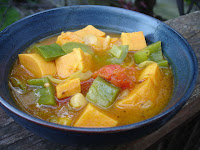I recently made this recipe for "Gypsy Soup", originally taken from Mollie Katzen's Moosewood Cookbook and featured on Cooking Books. This recipe is the springboard for today's blog post in honor of Feminist Coming Out Day.
As the post on Cooking Books points out:
In her book A Thousand Years Over a Hot Stove, Laura Schenone writes of Katzen's new vegetarian cuisine that is was liberating, that "a dish like Gypsy Soup offered not only a chance to rebel against the corporate powers that built weapons, pesticides, and commercial foods but also a chance to challenge mother's bland dishes and the narrow gender roles prescribed by Betty Crocker... [Gypsy Soup promised] an adventurous culinary and spiritual journey far away from those commercialized kitchens of the 1950" (Schenone, 330).
Laura Schenone's book is a fascinating look at the female presence in food preparation, from masdadon to macaroni and cheese. Schenone looks at a variety of specifics such as a slave woman's use of cooking skills to buy freedom for herself and her children, the prestige of "beat biscuits" and how the use of chemical leavening agents changed the scene of biscuit baking, and the vastly different views with which Lakota women would have viewed Pioneer women and vice versa. Hunger, immigration, food ethnicity, rationing, commercialization, and finally liberation are all discussed in this book.
It is interesting to note that in the modern push toward a more egalitarian society, the tradition of connecting our "selves" with our cuisine has taken a giant step outside of the home and into the commercial world. For me, part of the appeal of Mollie Katzen's Gypsy Soup recipe is that it seems to represent the entire time line of the past thousand years in cuisine. It begins with earthy, wholesome ingredients (made easily attainable to me by largely invisible commercial forces) and ends as an expression of my individual culinary expertise. It reminds me of the African proverb: "If we stand tall, it is because we stand on the shoulders of those who came before us." I have the ingredients and the cooking skills and the appliances and the spices and my particular palate because of the whole history behind my culture and civilization.



No comments:
Post a Comment